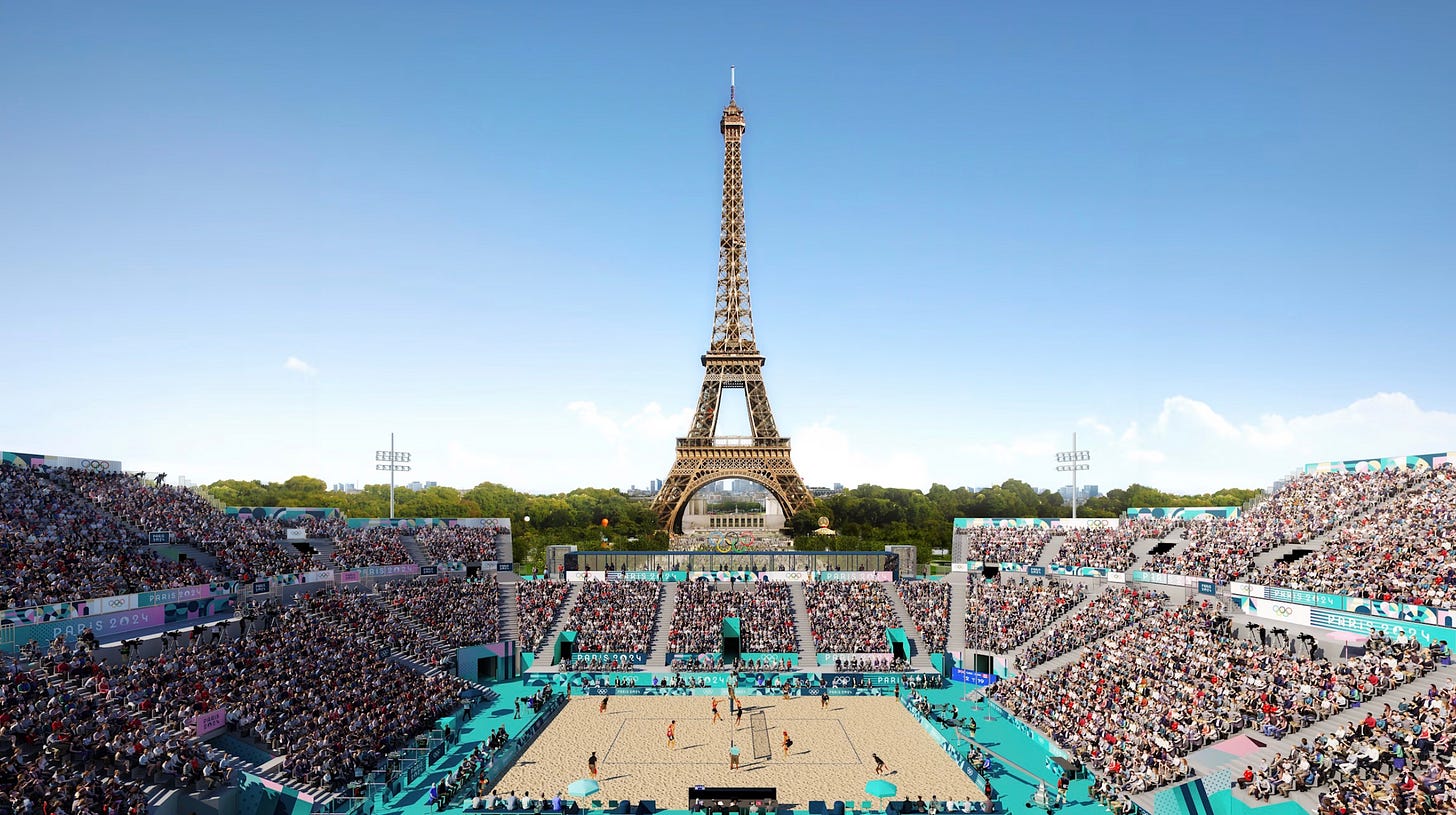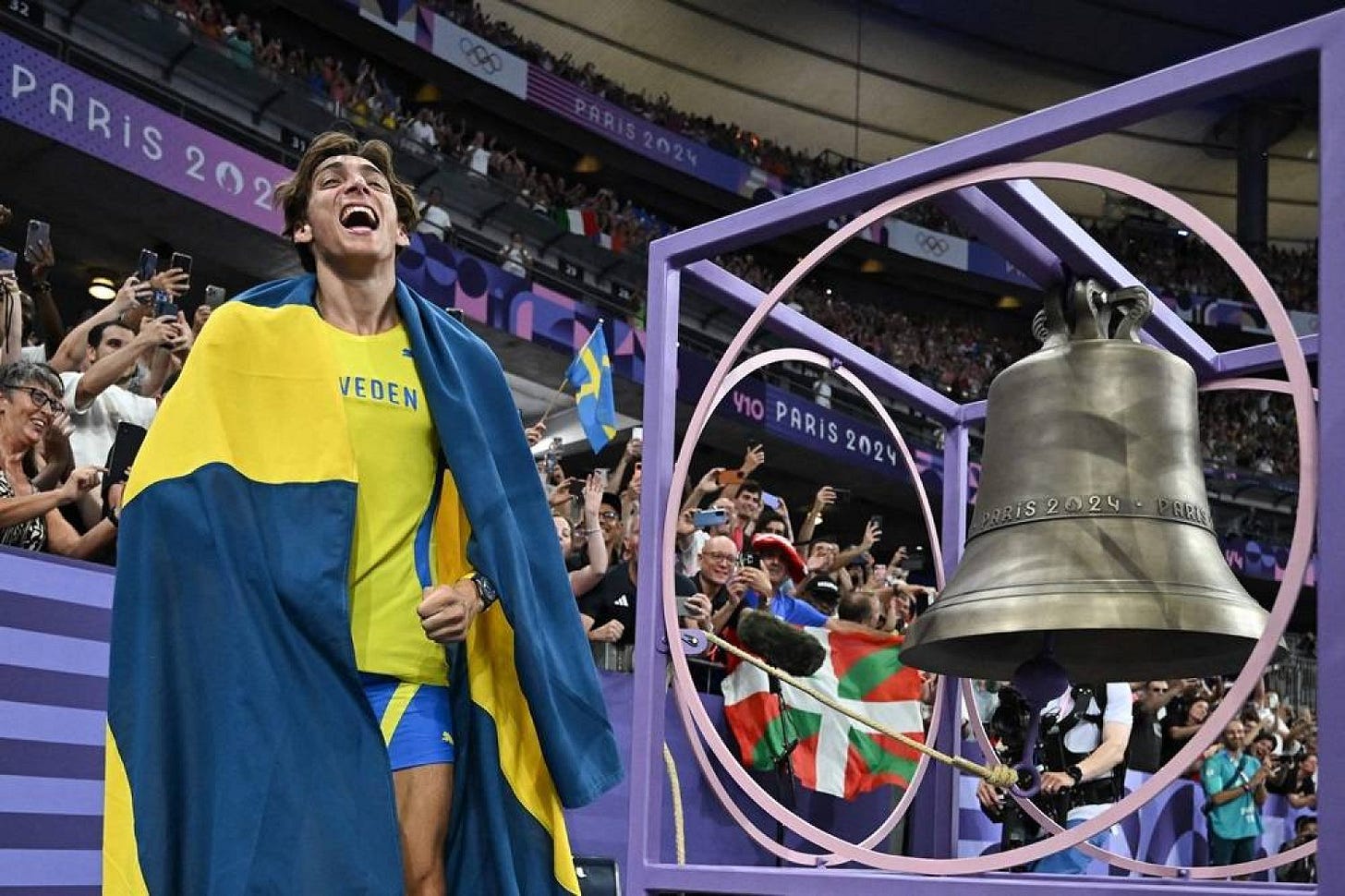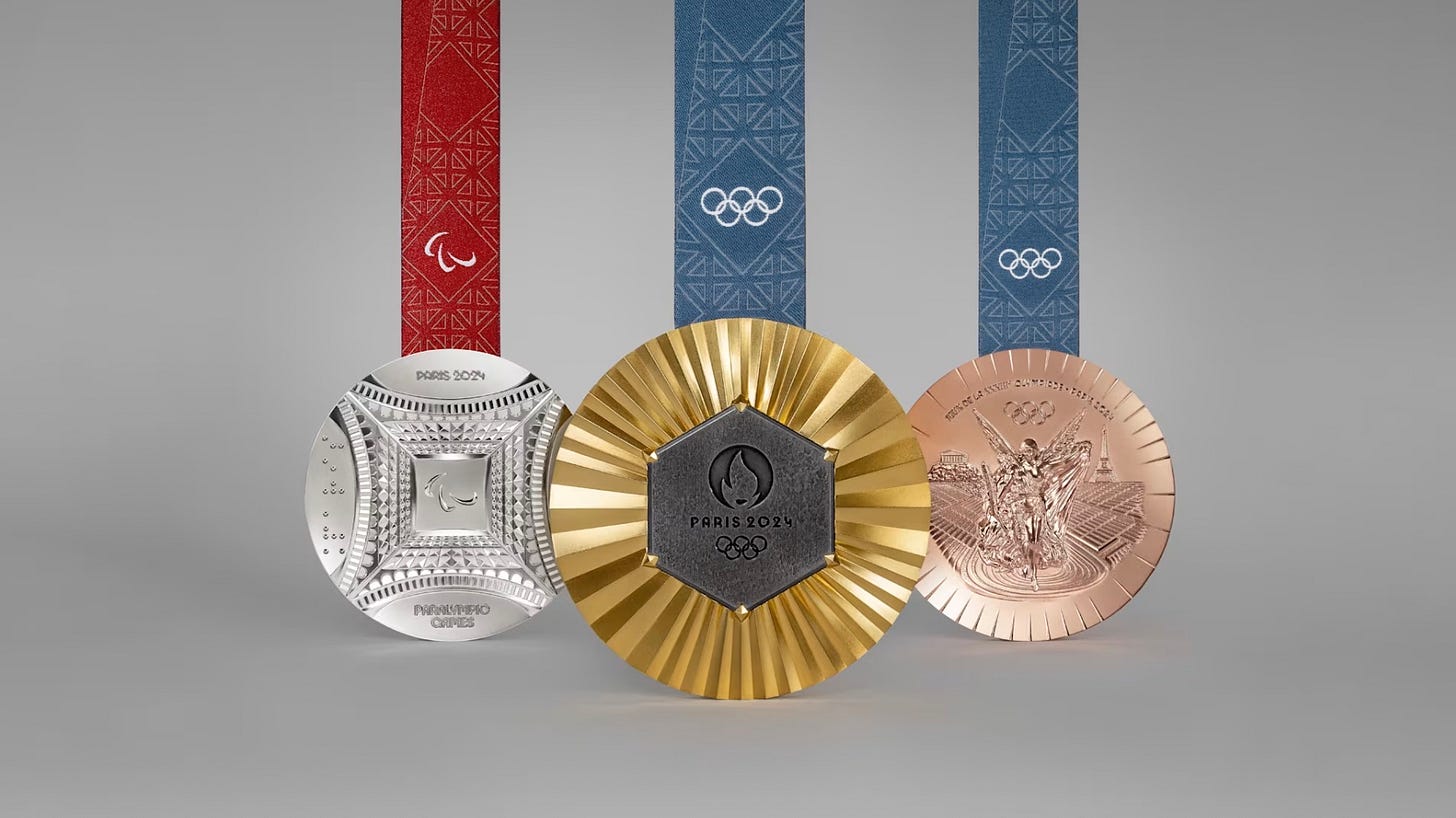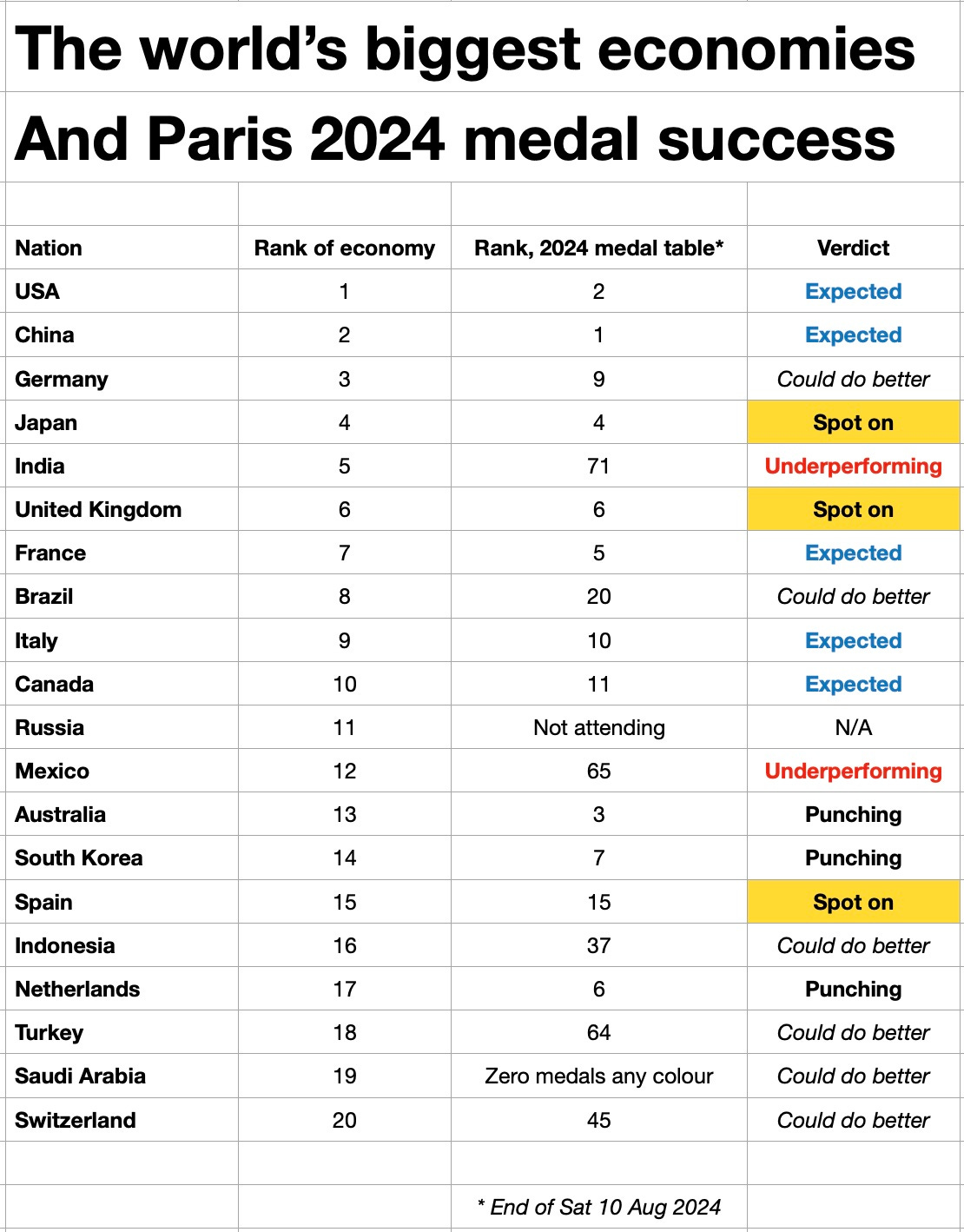Paris 2024: Shades of grey in the City of Light as France delivers glory Games
The Olympics have been a triumph and delivered compelling, dramatic sport in brilliant venues. But they've also raised questions we are all still struggling to answer.
The 2024 Paris Olympics finish today with a closing ceremony at the Stade de France that will reportedly feature Tom Cruise in “a death-defying stunt” on the roof.
The show’s artistic director, Thomas Jolly, has said that “Records” (the title of his showpiece) will combine “wonder" and “dystopia”. Other reports suggest it will depict a future where the Games no longer exist and then a group of space people reinvent them. Isn’t that just Los Angeles 2028?
The Paris Games have featured 10,714 athletes in 206 teams (204 nations plus the AIN and EOR), contesting 329 events across 32 sports, and they have been, in many ways, a triumph.
I watched the first week of this Olympics at home and found them compelling from the first day in a way that I haven’t for almost 30 years, since when I‘ve had to cover them for work. (It goes without saying that being paid to go to Athens or Beijing or wherever is a privilege but being able to decide for the entire duration what you want to watch, and when, and not to have to think critically about every event, is just … different).
I spent most of the second week of these Games in Paris, a city where I lived briefly in the mid-1990s and which I love. As usual, many Parisians have left for a chunk of the summer … and they’ve missed a treat.
I spoke to Paris residents who stayed - meeting them in bars, restaurants and fan zones - and they were almost unanimous in saying they expected to be disappointed but have been surprised the Games were so well organised - and enjoyable.
Not everything was perfect, of course. There was the E.coli in the Seine (below), an “offensive” opening ceremony, a gender eligibility row in boxing that made polarising headlines worldwide, a "doping" controversy and a comeback for Covid in elite sport. How the latter was handled was also polarising, but what isn’t these days?
No doubt some of my opinions on these Games will also be polarising but here are 10 takeaways.
1: The venues were brilliant
We were already familiar with the Stade de France (which hosted the rugby sevens, and athletics), and Roland Garros (tennis and boxing), and Le Golf National (which hosted the 2018 Ryder Cup), and the Vélodrome National (which hosted the 2015 and 2022 world track championships), to name just four venues that had previously hosted world-class sport.
But it was the re-purposing of iconic Paris landmarks that caught the eye, not just in aerial publicity shots but for the fans who experienced them. The temporary Stade de la Tour Eiffel (below) exemplified this.
Also striking was the transformation of Place de la Concorde as the Paris 2024 home for the BMX freestyle, 3x3 basketball, skateboarding and breaking, and the Gardens of the Palace of Versailles for the equestrian events.
As for the Paris La Défense Arena, normally home to rugby union’s Racing 92, it underwent a remarkable transformation to host the swimming.
And throughout the Games, the Olympic cauldron has been hovering over the Jardin des Tuileries.
2: Brilliant sport
It’s the Olympic Games, so obviously we expect to see the best exponents to be competing, and somewhere near their peak. Most Games produce standout moments but Paris had stories by the bucketload, every day.
I could list 100 but have settled on just a few handfuls from events I watched, and have broken them down into four categories: GOATS and record-breakers; heart-warmers; nail-biters; and “smashing it.”
Your own lists will be hugely varied and completely different. Feel free to share them in the comments sections.
GOATs and record breakers
Léon Marchand, the 22-year-old French swimming superstar and heir to Michael Phelps, won four individual golds - the first French Olympian to win four golds in a single Games - and a relay bronze. He became the first swimmer in history to win the 200m butterfly and the 200m breaststroke at the same Games, and he did it on the same night.
Simone Biles withdrew early from the Tokyo Olympics three years ago after suffering from the twisties, but Paris was the 27-year-old’s redemption Games. Her three golds and a silver in the French capital confirm her GOAT status.
Her 11 Olympic medals since 2016 and 30 world championship titles since 2013 make her the most decorated gymnast in history. (An honourable mention in the gymnastics goes to Brazil’s Rebeca Andrade, winner of a gold, two silvers and a bronze in Paris).
Mijaín López, the 42-year-old Greco-Roman wrestler from Cuba, became the first and only athlete in Olympic history to win five consecutive gold medals in the same event.
Katie Ledecky won two golds in the pool to take the 27-year-old’s career total of Olympic gold medals to nine. With 14 Olympic medals in total since 2012, she is the most decorated female American Olympian, the most decorated female swimmer of any nationality, and the woman with the joint most Olympic golds all of time, alongside Soviet gymnast Larisa Latynina, who won her golds between 1956 and 1964.
Ledecky is the fifth most decorated sportsperson in Olympic history, behind only Michael Phelps (28 Olympic medals, 23 of them gold), Latynina (18 medals), Norwegian skier Marit Bjørgen (15) and Soviet gymnast Nikolai Andrianov (15).
Armand Duplantis of Sweden won the pole vault gold, as he did in Tokyo, and then the 24-year-old asked for the bar to be raised so he could set yet another world record, his ninth since 2020.
Heart-warmers
Novak Djokovic won Olympic gold in the men’s singles, finally, to win the only thing in tennis that he hadn’t already won, and broke down in tears in arguably his greatest display of emotion. He then said it was the highlight of his career.
Andy Murray, meanwhile, ended his career following his exit from the men’s doubles, another moving moment.
Yusuf Dikeç of Turkey won silver in the 10m air pistol mixed team event but went viral because he did so in such an apparently casual manner.
He had no specialist eyewear, no ear protection, one hand in his pocket. To say he’s become a global phenomenon would be an understatement. Armand Duplantis celebrated his gold with a Yusuf pose. Other athletes have been mimicking Yusuf, including here and here.
Teddy Riner’s two golds on home soil in judo took his Olympic tally to seven Games medals in his career and the +100kg gold medal for Big Ted sent the crowd wild at the Grand Palais Éphémère as it was secured with seconds to spare.
Boxer Cindy Ngamba won the first ever medal for a member of the Refugee Olympic Team. The 25-year-old has lived in Bolton, England since the age of 11 and still hasn’t been granted British citizenship. Kellie Harrington’s second successive Olympic boxing gold for Ireland, and her retirement, were also hugely moving.
And I’ve literally lost count of the number of moments when I had something in my eye watching post-performance interviews with Olympians who cited late parents in what they said. Parents who would have been so proud, but are no longer around to witness these days of their lives.
“He was watching,” said one British rower to a medal-winning team-mate as the latter said she wished her late dad had been there to watch.
Nail-biters
The men’s 1,500m final on the track was set up to be a showdown between Jakob Ingebrigtsen of Norway and Josh Kerr of Team GB but was won by Cole Hocker of the USA. Kerr was second, Yared Nuguse of the USA third and the Norwegian was out of the medals.
Noah Lyles was a surprise winner of the men’s 100m, in the closest final ever, after Julien Alfred of Saint Lucia had been a surprise winner of the women’s 100m.
Alex Yee of Team GB mounted an astonishing comeback to win the men’s triathlon, just as his compatriot Tom Pidcock had come back from a puncture to win the cross-country mountain bike gold.
A French 1-2-3 in the BMX racing for France’s Joris Daudet, Sylvain Andre and Romain Mahieu was as exhilarating for the casual viewer as it was for the host nation.
I could go on, and on.
Smashing it
Keely Hodgkinson in the 800m, Remco Evenepoel in the men’s road race, Kristen Faulkner in the women’s road race (destroying her rivals in a whirlwind and devastating breakaway), and Lim Si-hyeon winning three archery golds. I could go on, and on.
3: Sport has a long road still to travel on gender eligibility
Imane Khelif of Algeria won boxing welterweight gold but not before enduring almost an entire Games of demonisation amid incorrect claims that she was a trans woman, and unsubstantiated claims she has XY chromosomes. She was born female, raised female, identifies as a woman and is a woman according to her passport, the latter fact being crucial because under IOC rules, being a woman in your passport makes you eligible to take part in women’s events at the Olympics.
This is a hugely complex, divisive and polarising area, and Yu Ting Lin of Taiwan was also caught up in the storm of controversy in Paris.
Making the whole situation more cloudy still, and ever more toxic, is that boxing’s world governing body, the IBA, formerly AIBA (infamous for massive corruption) has been banned from the Olympics and is no longer recognised by the IOC.
So instead of the IBA organising the boxing at this summer’s Games, the IOC organised the boxing, and used IOC rules to determine who could fight or not.
The IBA claimed in a shambolic press conference during Paris 2024 that Imane Khelif had been disqualified from the 2023 world championships after the IBA “concluded the boxer’s DNA was that of a male consisting of XY chromosomes.”
Journalist Alan Abrahamson tweeted during Paris 2024 that he had seen the test results and a letter the IBA wrote to the IOC about this matter in 2023.
But the IBA have failed to substantiate their own claims with evidence, and there is in any case an ethical minefield of enormous proportions to cross before they could even start to disclose personal medical details of athletes.
I could explore in detail how the gender eligibility rules are different according to sports, but NBC has done this so if you want that much detail, read it.
The IOC effectively told global governing bodies years ago: “Make your own rules according to the specifics that suit your sport.” And they did, and they vary hugely.
There are entirely legitimate debates and decisions to be made about the fairest and safest ways for athletes who are trans or have DSDs (and yes, I know these are utterly different) to compete in sport, including at the highest level.
We are nowhere near a consensus, and the added poison injected into the subject by the geopolitics surrounding Russia’s control of the IBA doesn’t help.
4: Build it, they will come: the triumph of free fan zones
The organisers of the 2024 Games set up 25 fan zones across Paris, all of them giving free entry to public spaces with giant screens, food and drink stands, play areas and a variety of “awareness raising spaces”.
I visited four of them, the first of which was the “Champions Park” at the Jardins du Trocadéro in the 16th arrondissement. From 4pm to 11.30pm most days, thousands of people were allowed into a seated arena to be entertained by a DJ, then watch a parade of medalists from the day before, and then watch big-screen coverage from around the Games from 7pm each evening. It was utterly rammed when I got there and the first-come, first-served queue was already so long we clearly weren’t going to get in.
So instead I went for dinner nearby with a couple of friends and Fred Sirieix came in for a meal while we were there, with his medal-winning daughter Andrea Spendolini-Sirieix, who won Paris bronze in the 10m synchro, and other family and friends.
On Thursday, I went to three fan zones. The first was at the Académie du Climat (4th arrondissement), where there was an exhibition on climate change, a courtyard bar and a big TV inside to watch the sport.
The second - and the best of the lot - was at the Hôtel de Ville (below), also in the 4th arrondissement. This had two giant screens, each with big banks of seating, a basketball court where kids in wheelchairs were trying murderball, table tennis tables, a stage for performers, a climbing wall, an elevated walkway to look over the Seine, and reasonably priced food and drink.
The third, where I spent Thursday evening, was at the Place Saint-Sulpice (6th arrondissement), which had a huge screen, beach recliners, a bar and food vans, and hundreds of happy Parisians (and a few tourists).
If the free fan zone venture seems a simple and obvious move, I imagine it was actually a massively complex logistical task to pull off so smoothly. France 2024 did it with panache.
5: Doping at Paris 2024: we ain’t heard nothing yet
Chinese swimming was in the spotlight before Paris 2024 following reports in April by the New York Times and the German broadcaster ARD that 23 Chinese swimmers tested positive for a banned substance before the Tokyo Olympics in 2021 and were not punished. The drug in question was trimetazidine (TMZ), a prescription medication that increases blood flow to the heart.
Some of the 23 swimmers went on to win medals in Tokyo, including three golds, and neither the world anti-doping agency, WADA, nor the Chinese agency, CHINADA, had made any public announcement about the case. WADA had accepted an explanation from China that the TMZ positives were due to contamination in food the 23 swimmers ate at a hotel. WADA hadn’t actually been able to investigate the validity of this themselves due to Covid travel restrictions, but equally could not disprove it.
It is the lack of transparency that subsequent angered many, including the US anti-doping agency, USADA and multiple swimmers from assorted nations.
Even trace amounts of TMZ should have led to a finding of a failed drug test, and potential punishment. Following the NYT and ARD reports, WADA released a lengthy statement defending itself. And following that, the NYT further reported that two other Chinese swimmers, Tang Muhan and He Junyi, had tested positive for a banned anabolic steroid, metandienone, but been cleared because it was accepted this was a result of eating contaminated meet in a burger.
Tang, 20, had won a relay gold in Tokyo, and she won a relay bronze in Paris. As for the 23 swimmers who had been supposedly contaminated with TMZ in 2021, no fewer than 11 of them were in the Chinese swimming team in Paris.
Among those 11, a majority of them, or six, won at least one medal at the Games. They were Zhang Yufei, who won 6 (six) medals in Paris; Yang Junxuan (who won 4); Qin Haiyang (2 medals, 1 gold); Yu Yiting (2) and Sun Jiajun (1 gold) and Wang Shun (1).
The Chinese swimmers in Paris vehemently denied any wrongdoing and said they had been tested many times more than their rivals ahead of the Games. A debate about the efficacy of testing and the need for greater transparency will rumble on.
I can guarantee you one thing: in the years ahead it will be revealed that dozens of participants in the Paris Games - and I don’t mean swimmers, or just swimmers, necessarily - will be shown to be drug cheats.
Dozens of athletes were discovered, years later, to have had banned drugs in their systems iat Beijing 2008, following retesting of samples using new technologies seven and eight years after those games. No fewer than 73 dopers at London 2012 - supposedly the cleanest Games that were actually dirty - were retrospectively discovered by December 2022, and had titles stripped or reallocated.

Re-analysis of athlete samples from Rio 2016 got underway in December 2023, and as recently as last month, it was announced that two weightlifters at the Games eight years ago had now had their cases sent to the anti-doping division of CAS for consideration.
It will be late 2026 by the time we know how many more dopers were in Rio, and 2031 before the Tokyo list of shame is complete, and late 2034 - probably in the middle of the football World Cup in Saudi Arabia, at a time when it will be easy to bury 10-year-old bad news - that the final tally of unmasked drug cheats from Paris 2024 is known.
And so the wheels of justice will turn. Slowly.
6: Freshened-up Games keeps them relevant
The sport of breaking - or breakdancing - made its Olympic debut in Paris, and while it’s possible this will be the first and last time it appears at a Games (it won’t be on the schedule at LA2028), it was a big hit with the crowds and with TV viewers. Japan’s Ami Yuasa, aka Ami, won the women’s event and Canada’s Philip Kim took men’s gold.
Snoop Dogg was there! (He was everywhere).
Three sports that made debuts in Tokyo - skateboarding, sport climbing, and surfing - were back in Paris, with the sport climbing tweaked.
Other Paris 2024 innovations included a new class in sailing, Formula Kite; the introduction of kayak cross, with four athletes going head to head; men participating in artistic swimming; and new mixed relays in athletics.
Early data shows that Paris 2024 has been a big hit for major broadcasters, not least in the USA, where innovation isn’t just about sport but about the manner in which consumers are watching, and in host nation France.
7: Covid at Paris 2024: shocking twist or new reality?
I almost certainly had Covid in the first week of July but I had no inkling about it until 15 July, and didn’t consider for a moment that it was Coronavirus when I felt slightly rough on the first weekend of July.
I’m sharing this extremely minor medical trivia because I’m in two minds about the “outbreak” of Covid among athletes at Paris 2024 and their different behaviours knowing they had it.
My timeline of probable Covid ran thus: I was at Wimbledon on 1-2 July, spending time with a journalist friend who I would only discover on 15 July missed the second week of the tournament having tested positive for Covid.
I felt a bit rough (tired, fitful sleep for two nights) on Friday and Saturday 5-6 July. I put it down to dehydration and fatigue from on ongoing road trip. By the Saturday evening, when I went to England-Switzerland in Dusseldorf with a friend, Helena, I felt better. It was only when I next saw Helena, on 17 July, that I found out she’d been in bed for a few days just after Dusseldorf, feeling really rough.
Upshot? I almost certainly caught Covid at Wimbledon from a friend who was later a confirmed positive. I felt slightly rough, but not for long, a few days later. It didn’t even occur to me I had Covid, and even if it had, I didn’t have any tests with me. I haven’t done a Covid test since 2022. My road trip carried on. Unknowingly I’d probably given Covid to Helena. We’re all fine now.
Some 40 athletes, at least, have tested positive for Covid at the Paris Games. They include the USA’s Noah Lyles, who won the men’s 100m and revealed after he failed to win the 200m that he had Covid. His presence in the latter race outraged many. "We were just going to try and quarantine as much as possible and stay away [from other people], not try and pass it off," he said.
Team GB swimmer Adam Peaty and Australian swimmers Lani Pallister and Zac Stubblety-Cook were among others who had Covid during the Games. German decathlete Manuel Eitel got it and went home.
There have been no Covid protocols in Paris, the virus now being treated pretty much as if it were a common cold or flu. Individual athletes and teams decide how to limit the spread of infection. There are no mandatory tests. Anyone feeling ill is encouraged to wear a mask but it hasn’t been mandatory.
There have been summer Covid surges in the general population across Europe and the USA among other places.
Maria Van Kerkhove, the World Health Organisations epidemic and pandemic preparedness and prevention director, said last week that Paris 2024 organisers and the WHO had worked together to prevent disease circulation at the Games and the right measures were being taken.
"We have observed more people wearing masks at the Olympics, and I think that is to take into consideration the circulation of SARS-CoV-2," she said. She added that people must realise Covid hasn’t gone, and the drop-off in vaccinations is alarming.
8: Have we seen the last ever Games won by bid?
Olympic Games have traditionally been awarded by bidding processes where aspirant hosts submit what are in effect “offers” to the IOC, explaining how they will stage “the best Games ever™.”
IOC members then visit the bidding cities, and about seven years before any given Games, the winner is announced after an IOC member vote. Paris and Los Angeles were the final two cities in the running for 2024 and a decision was made in July 2017 to give 2024 to Paris and 2028 to Los Angeles.
In 2019, the IOC announced, in this word salad press statement, a change in the way future Games would be awarded. The effect of those changes is basically the IOC can pick a nation and award it hosting rights. In 2021, Brisbane was awarded hosting rights for the 2032 Games.
Some observers think this was a reward for 74-year-old IOC vice-president John Coates’ long service to the IOC and sport. He’s an Aussie.
How future Games will be awarded remains to be seen. India are desperate to host in 2036 but we’ve probably seen the end of Olympics decided by bid races. If the IOC want to deem that Saudi Arabia, or Qatar, or indeed any mega-wealthy country, is the best place for the world’s greatest festival of sport, then that can happen.
9: Medallists depart with part of the host city
The medals at Paris 2024 each had a small piece of the Eiffel Tower embedded in them. How cool is that?
10: More money, more medals?
In many areas of professional sport, there is a correlation between spending (on salaries, particularly in elite football) and success. The more you spend, the better your results.
But what about the Olympics?
Below is a table that lists the 20 largest economies in the world, and the position of each of those nations in the Paris 2024 medals table by the close of play yesterday, Saturday 10 August.
The two biggest economies in the world, the USA and China, have been vying for the No1 and No2 spots in the medals table. Japan, the UK and Spain were in precisely the same spots in the medals tables as they are in the economies rankings. France, Italy and Canada were all close.
India and Mexico are arguably the most underperforming nations at these Games, if we are taking economy size as a proxy for wealth, and therefore resources.
And Australia, the Netherlands and South Korea having all been punching above their weight.
Thank you for reading. I’m hoping that the next piece you’ll be getting on Sporting Intelligence will be an interview with 2006 Tour de France winner, Floyd Landis, who was then stripped of his title for doping and later became the man who brought down Lance Armstrong. The interview will feature questions from you, the readers, and you can find out more about that here.












Had the fortune of attending the middle weekend of the games. The biggest stand out for me was how the city embraced them. It likely helped that France performed very well, as it kept the locals interested. Some of the venues were iconic as well, and everything was so well organised! Bravo Paris
I'm biased but I think New Zealand kayaker Lisa Carrington needs to be in the conversation of Olympic GOATS, picking up 3 golds in Paris to take her tally to 8 golds 1 bronze since the 2012 London Olympics.
Really enjoyed these games.